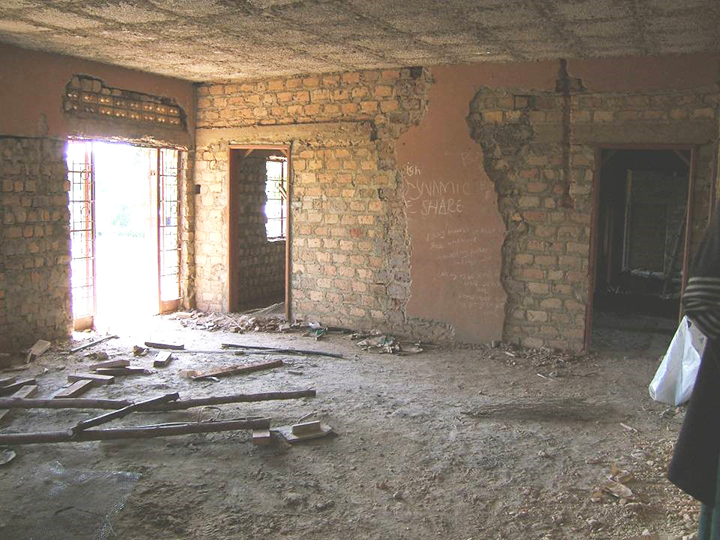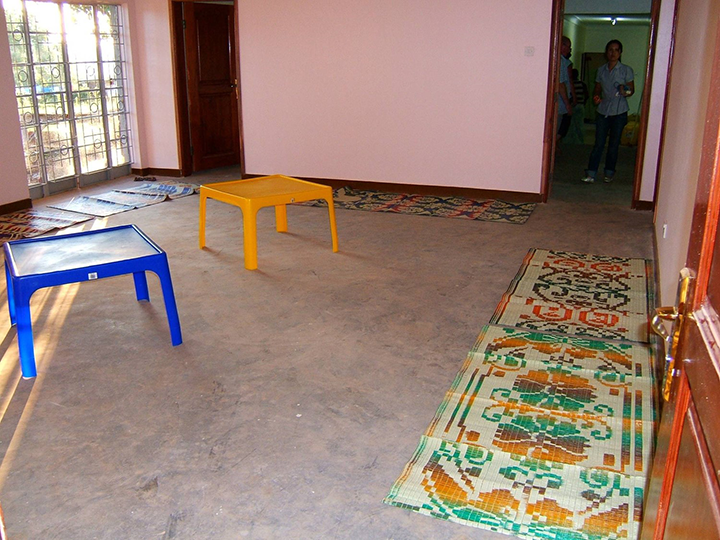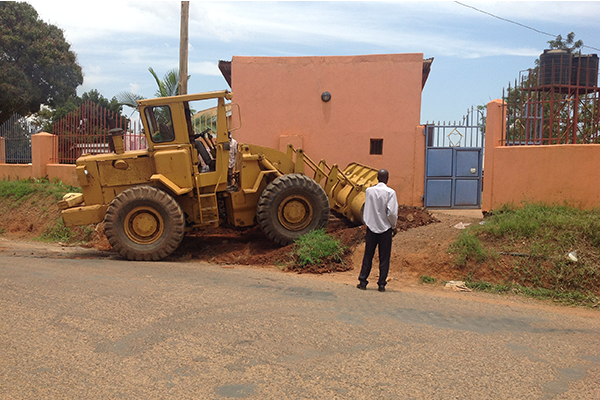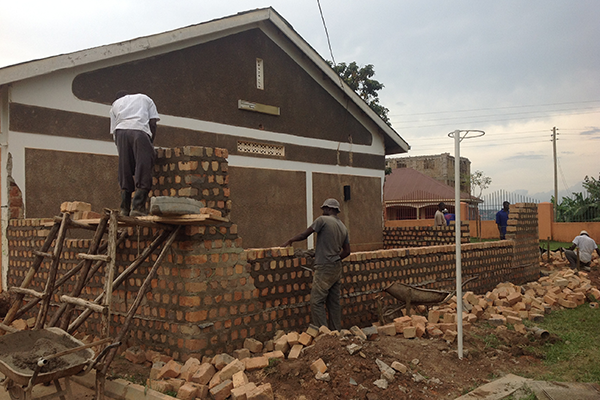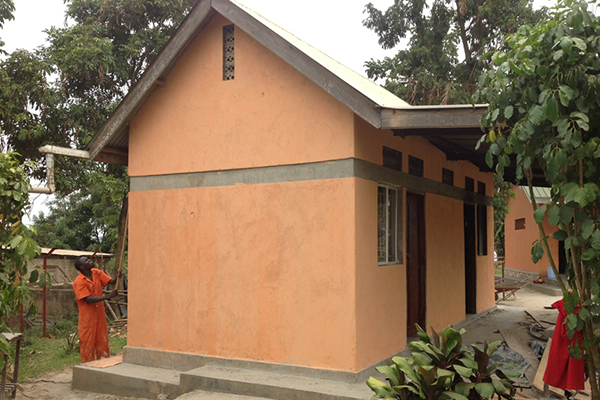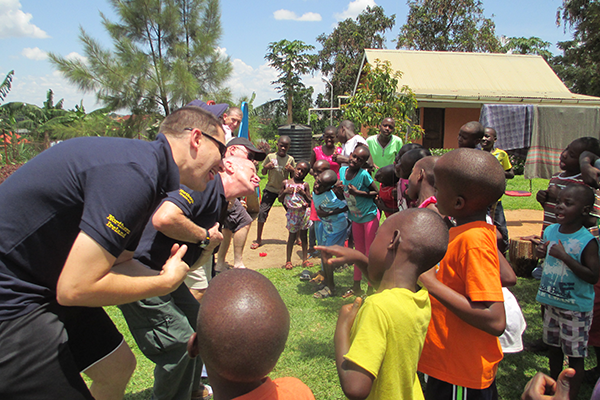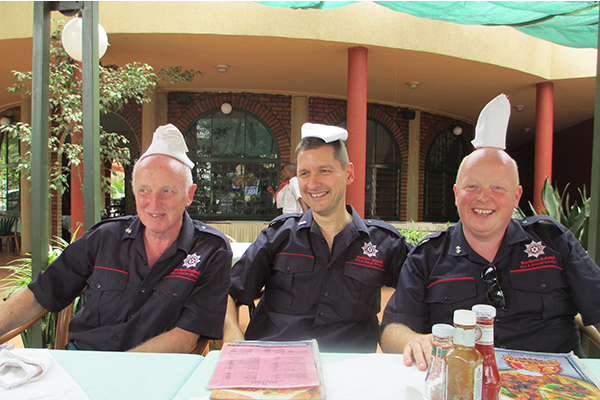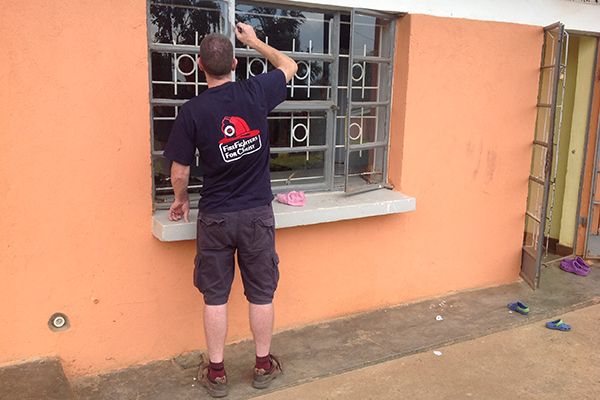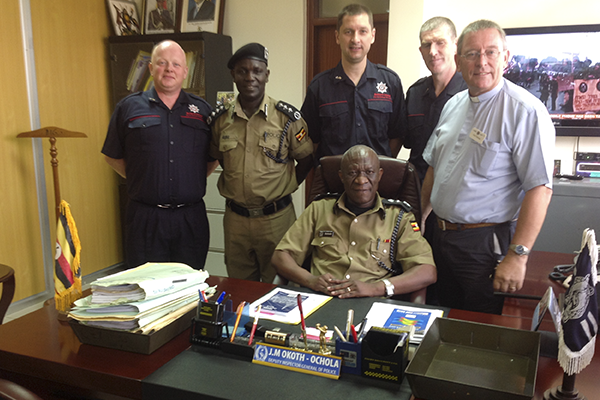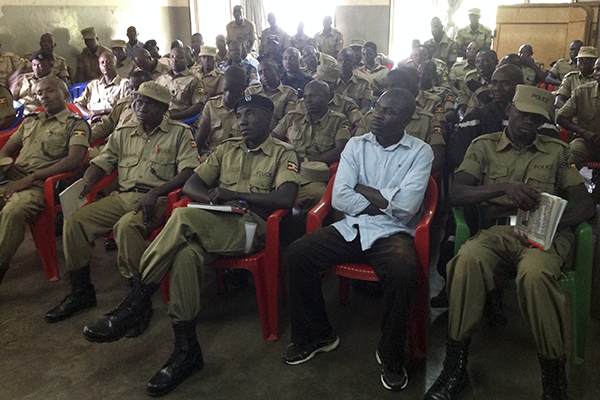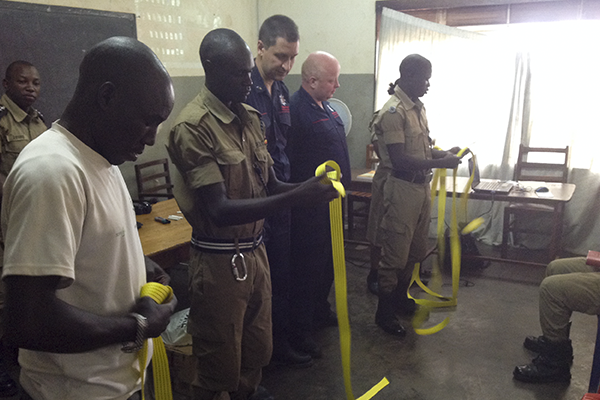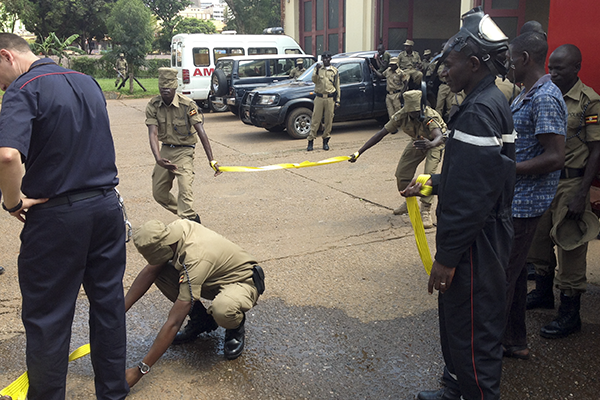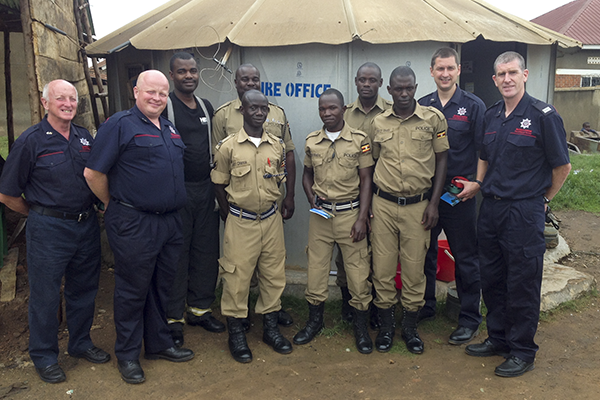Paul Thomas, BEM - Founder and Team Leader
Having been awarded the British Empire Medal in 2017 for his services to charity in Africa and pastoral care to the Fire Service in Wales, we speak to Paul Thomas BEM, Founder, Trustee and a Team Leader of Tŷ Cariad Africa to find out a little more.
Firstly, can I say congratulations and how pleased we are that you were honoured in the Queen’s birthday list, and awarded the British Empire Medal for your services to charity in Africa, and for pastoral care in the Fire Service in Wales. It must have been an exciting week for you!
Thank you, it has been amazing. It was a great honour to be awarded the British Empire Medal, and I have been overwhelmed by the comments on the Tŷ Cariad Africa Facebook page – I don’t yet have a Facebook account otherwise I would thank you all personally, but please accept my thanks for your very kind comments.
The British Empire Medal (BEM) was awarded partly due to your services to charity in Africa. How did it all start for you?
In 1999, I was invited to join a mission team to Uganda whilst I was still working as an operational Firefighter in South Wales. This was the first of a number of trips made over the next couple of years. During these trips, I made a point of visiting my Ugandan colleagues in the main Fire Police Station in Kampala. As a Firefighter, wherever you go in the world, you are automatically welcomed as a family member into whichever station you visit.
I retired as an operational Firefighter in 2002 and by then had become the Chaplain to the South Wales Fire and Rescue Service. In the same year, I made another visit to Uganda, and as had become the norm, I visited the Kampala Fire Police station, this time as their honorary Chaplain. Whilst there, one of the crews returned from a very tragic incident, where they were called to rescue two newborn babies who had been dropped into a pit latrine. Tragically, both babies had died and their bodies were recovered by the crew. As I went to greet the crew, they were obviously very distressed at what they had just responded to and said to me “Pastor Paul, this is what we have to deal with on a regular basis, what can you do about it?”
Very distressed, I left the station and met up with my close friends Pastors Joseph and Freda Serwadda at their home in Namugongo. I told them of the events that had just taken place and said, “what can we do help rescue these little ones?” Joseph and Freda had been helping to look after hundreds of children in desperate need over the years through their Victory churches throughout the country, and upon hearing my report, they said they had a semi derelict building near their home which could be turned into a children’s rescue centre. At that moment, the Tŷ Cariad home was birthed in Namugongo, Uganda, and this was the start of the partnership between Tŷ Cariad Africa and Victory Child Care Project.
On my return to the UK, intense fundraising began by myself and a number of close friends to allow the renovation work to start. It was truly amazing to see how much could be done with so little. Approximately eighteen months later, the first children started to arrive and lived in one room. These children were looked after by a wonderful Ugandan lady called Haawa, who lovingly cared for them.
So once the renovation was complete, was that your job finished?
Not exactly! Since the renovation, building work has continued steadily to reach the point it is at today, where in addition to the above, we have also built a new home for the older girls, a new block for independent living for the older boys, an education suite, a bore hole with pumping stations and extra capacity for storing the water, a new outside kitchen, a block for children who come for temporary care, a guard house and new entrance and exit gates for the site. There have also been smaller projects, converting bedrooms into bathrooms, building staff quarters, septic tanks etc.
That’s a lot of building projects – why have you built so many new things?
The main reason has been to support the extra services that Victory Child Care Project now offer for orphans, vulnerable children and communities. When this project first started, the idea was that it provided a safe place for these children to live, receive care and love, and an education. Child care provision in Uganda has changed, and is changing, and the desire of Victory Child Care Project is to provide both reactive services and proactive services, and our role is to support them in raising finances to enable us to jointly achieve these goals.
You mentioned that child care provision has changed and is changing, can you explain?
Of course. As I mentioned, when this project first started we were looking to build a safe haven for these orphans and vulnerable children, and at a time when the AIDS epidemic was sweeping through Uganda leaving devastation everywhere. AIDS is still a problem, but with the Antiretroviral drugs (ARV’s), the quality of life can be greatly improved.
It was also a time when many parents were placing children in care, sometimes by not telling the truth about their situation, so that the children would receive a better quality of life – fed regularly, educated, health care etc. – and in some cases this meant the difference between life and death for these children. Over recent years, we have seen an increase in social worker integration in various child care institutions in Uganda, and we are very happy that Victory Child Care Project also has a great social work team who assess and advise regarding the cases that they receive. We see this as a vital part in our continued support of a project that is meeting the needs of Ugandan children, provided culturally by Ugandans, with our support.
So what services does the project in Uganda provide?
There are a number of areas that the project currently provides:-
The project still offers residential care for children who need medium and longer term care, but every effort is made to reunify children back into their families as long as it is in the child’s best interest. Since the social workers have become involved in the shaping and running of the project, we have a greater understanding that the reasons surrounding the vulnerability when the child was first admitted into care may have changed, or can be changed with our support. Economic vulnerability is no longer a valid reason for keeping a child in a residential institution, and so, where we can, we look to support the financial needs of reunifying a child such as education fees, medical fees and social worker costs to manage and evaluate each placement.
Is reunification of these children as easy as just paying their school fees?
Unfortunately not, there is a lot of social worker intervention and relationship building that needs to take place between each child, their family members and the local community. The payment of school fees and other associated costs are just the final link to helping ensure a successful reunification. It would be fantastic if the families were able to pay for all their child’s needs, but unfortunately this is usually unattainable, especially at the outset of reunification – there’s no point in putting these children back in to an economically vulnerable position which may lead to another case of neglect or abandonment.
There are also more complex cases which will require more social worker and financial interventions, and quite often these are cases where brothers and sisters are involved. Uganda is a country of large families where it is not unusual to have at least four children, and when you are trying to reunify these family units, quite often you will have issues with providing somewhere big enough for all the family to live, and so more funds are required to enable reunification.
What happens if a child cannot be reunified?
Some children cannot be reunified either because it is not in their best interest, or perhaps the social workers have been unable to trace family members. For these children, we are looking to run a foster care programme so that they will get the opportunity to grow up in a family. Again, as with reunification, we will look to support their educational, medical and related social worker costs if necessary.
That’s quite a lot more than you originally provided
Yes it is, and that’s not all. The project now also looks after children for temporary or short term care. These will be children brought to the project by the government via their childline initiative, or by the police, and can be children who have been lost, abandoned, or trafficked. We have seen a great need for this, and over the past 2.5 years the project has received over 85 children who have stayed at the project for anywhere between 2 days and a few months while the police trace relatives and ensure that it is in the child’s best interest to be returned to their family members.
That’s a lot of children!
Yes it is! We were made aware of the great need by the local police and were able to obtain grant funding to build a large room to accommodate these children. Before the project was able to receive these children, they were sleeping in corridors between cells in the police stations, between occupants of cells, and in atrocious conditions. There were no meals provided for them, and they relied on police officers buying food for them – it was terrible! When they come to the project for temporary care, they are cared for by the house mothers, well fed with three meals per day, provided with clean clothes, and my favourite part is the way that the children already at the home welcome them, giving them a guided tour, and including them in everything they do. Most of the children have been reunified with family members thanks to the amazing tracing work that the Police do, but for the few that cannot be reunified, then the social workers will explore foster care provision for them.
The project has also recently started working in the local community with a vision to strengthen families and therefore prevent possible future abandonments due to vulnerability. At the present time we support 28 local children for their education costs. Brian (social worker at Victory Child Care Project) is working with nine mothers of these children having enrolled them on to the Income Generating Grants programme. They have been provided grants to set up or enlarge their current businesses, and he is helping to develop their business skills. It is hoped that given time, these mothers will be better placed to provide for their own families in the years to come, but we are also using it as a pilot project to see what difficulties we can expect before using this project for parents of children who have been reunified or fostered.
Wow! That’s quite an increase in provision of services since you started, how has that impacted Tŷ Cariad Africa?
Yes, a massive increase in services to help these little ones, which has meant an increase in staff – currently 15 in Uganda and now one in the UK – and a massive increase in costs to support it.
Where do you get your funding from?
We apply for grants and have received some which has helped, but a lot of what we get is from personal donors who have heard about what we do and want to be a part of it. Our income has increased over the past 8 years from around £10,000 a year to £70,000 a year, but we are desperate for more regular givers to support the work and to help us provide the future that these children deserve.
If anyone reading this would like to help support this amazing work, how can they do it?
Our main fundraising vehicle for regular givers is the 300 Club for education. Education is our major outlay, and by giving to this on a regular basis, it will help us to create a sustainable model, and be able to make a difference, offering support to more children that are desperately in need of our help. For further information on how you can help, please click the link below.
I would also ask that you Gift Aid it if you are a UK taxpayer and eligible to do so – it means that on a £20.00 donation, we can reclaim an extra £5.00 in tax – that increases our provision of services by 25%!
If you would like to give by cheque or a direct transfer into the bank, or if you are interested in supporting a reunified child or for any other questions you may have, please contact Harvey in the UK office.
Paul, thank you so much for your time and speaking with us about this fantastic project. Is there anything else you would like to say?
Yes, thank you so much to all who have contributed or who continue to contribute to Tŷ Cariad Africa and Victory Child Care Project. It amazes me when I look back to the first conversations with the firefighters in Uganda and with Pastors Joseph and Freda, just how far the project has come. I also wonder what it will look like in the next 10-15 years!
I thank the Police and Fire service in Uganda. They were the initial reason that this project started – they planted the seeds and made me question what we could do. Since then the links with the Police and Fire service and their officers has continued and developed. Over the years, teams from the UK and firefighters from Firefighters for Christ from Northern Ireland and America have visited various fire stations, and trained them in First Aid, Casualty Handling, Rescue Techniques and generally stood with and encouraged them in their careers. These relationships have developed, and Fire and Police officers are still involved today, and are working closely with Tŷ Cariad Africa and Victory Child Care Project.
Thank you to the amazing staff at Victory Child Care Project! Without you, no amount of money would make a difference. Your love, dedication and determination to make a difference where you can continues to encourage us and keep us focussed on raising funds to support the incredible work that you do.
Thank you to all who have contributed to this work so far, without your help, we would not be in this privileged position, helping these children and their families and making a difference.
Thank you all once again for your kind comments on social media after being awarded the BEM!



